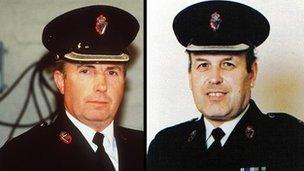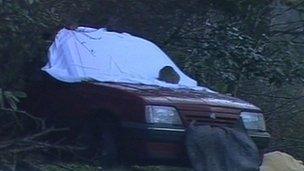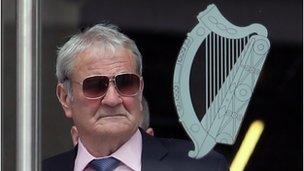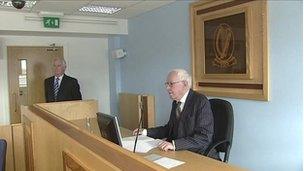Smithwick Tribunal: Garda counsel criticises PSNI
- Published

Ch Supt Harry Breen and Supt Bob Buchanan were murdered by the IRA in March 1989
A lawyer for the Garda (Irish police) commissioner has accused the PSNI of failing the families of Chief Superintendent Harry Breen and Superintendent Bob Buchanan.
The two were the most senior RUC officers murdered by the IRA during the Troubles.
A public inquiry into the murders ended on Friday.
It examined allegations of Garda collusion in the 1989 murders in south Armagh.
On Friday, the counsel for the Garda said no intelligence at the time had suggested that any Garda mole had passed on information that led to the murders.
He said 24 years after the murders and eight years into the tribunal, the inquiry was suddenly presented with a "Niagara" of intelligence that PSNI Assistant Chief Constable Drew Harris swore under oath was accurate and reliable.
He said ACC Harris was paraded before the tribunal with his rank to give weight to what he had to say.
However, he said the intelligence had been withheld and could not be checked even though the PSNI had promised to share it with the Garda. He said they had not done so.
The lawyer told the retired judge that he, Judge Smithwick, was "old enough and wise enough to see through all of this".
"It beggars belief as to how you are expected to come to adjudication, not merely in relation to this evidence, but in relation to the issue of collusion as a whole, having regard of the actions of the PSNI," he said.
"It is not merely nonsense, but as has been said, 'it is nonsense upon stilts'."
Counsel for the PSNI maintained the force had done everything possible to co-operate with the tribunal.
He accepted there may be criticisms about how intelligence was handed over, but said it was live intelligence.
'Long shadow'
The murders of the two RUC officers after they had left a meeting with Irish police in Dundalk, County Louth, have cast a long shadow.
Speculation that a garda mole had been involved was quickly denied.
At the time, the then Garda Commissioner Eugene Crowley said: "I absolutely and positively reject any suggestion of that kind."
And his counterpart north of the Irish border, the then RUC Chief Constable Sir John Hermon, added: "There was no mole and we would ask that this be discounted very firmly and very quickly."

The RUC officers were shot dead in an IRA ambush on their return from Dundalk Garda station
But for decades the speculation persisted.
When the Smithwick Tribunal was finally established in 2005, the families were relieved that those suspicions could be examined.
William Buchanan, a son of Supt Buchanan, said: "I think what it's done for the family is that it has provided us with greater information and a greater understanding of the events on the day and the surrounding events.
"I have no doubt it's painful to hear a lot of the detail. A roller-coaster of emotions for all of us."
Over 200 witnesses have testified, including former IRA members and spies in the British security services.
'Denials'
Many allegations were made, some centring on former Garda sergeant Owen Corrigan.
He denied collaborating with the IRA, despite one RUC intelligence document that said he passed on information.
Suspicions have also fallen on two other Dundalk gardai; Leo Colton and Finbarr Hickey.

Former Garda sergeant Owen Corrigan denied allegations he colluded with the IRA
They too deny leaking information to the IRA.
The veteran security journalist Chris Ryder, who has taken an interest in the inquiry, said: "The tribunal has uncovered lots of intelligence from the RUC side that there were suspicions of various gardaI in Dundalk, that irregular activity was taking place between the Garda and the IRA."
However, Mr Ryder added that the hearings "have not uncovered specific evidence of a smoking gun which proves beyond doubt that the two RUC officers were betrayed by Garda Siochana officers".
The inquiry, which is expected to cost about 12m euros (£10.2m), will have to decide, on a basis of probability, whether gardai leaked to the IRA.
'IRA surveillance'
It will define collusion not just as actively passing on information but also as turning a blind eye to something that gardai should legally and morally have opposed.
Much of what was said in evidence took the form of claim and counter-claim, giving rise to contradiction and confusion.
In a statement to the inquiry. the IRA said the killings were the result of a lengthy surveillance operation and that they had no help from any garda officer.
While one British intelligence document suggested there were several Dundalk gardai up to and over the rank of sergeant leaking to the IRA, another British intelligence document said none of the three mentioned in the tribunal helped the IRA.
'Difficult task'
The inquiry also heard evidence of the PSNI not passing on recent intelligence on the murders to gardai.
So, the chairman, retired judge Peter Smithwick, will have a difficult task in reaching a definite conclusion.
And William Buchanan believes the powers of the tribunal will not help him.
"I think one of the frustrations for the family is that the judge only has power in the Republic of Ireland and the frustration of not being able to compel people outside the Republic of Ireland.

Chairman Peter Smithwick did not have the power to compel witnesses from outside the Republic
"We have a lot of witnesses who decided not to come and we can't force them to come," Mr Buchanan said.
The Breen and Buchanan families may now have to wait until October to find out what the chairman has made of the evidence given to the tribunal.
- Published31 May 2013
- Published29 May 2013
- Published9 April 2013
- Published1 February 2013
- Published1 February 2013
- Published18 October 2012
- Published9 March 2012